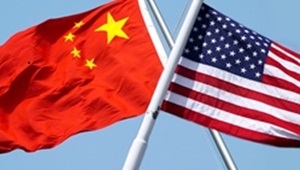US hikes tariffs on $200 bn of Chinese goods, Beijing hits back
19 Sep 2018
China on Tuesday raised tariffs on $60 billion of US products imported into the country in retaliation to President Donald Trump’s latest duty increase in a dispute over Beijing’s technology policy that tended to undermine US industrial prowess.

China’s finance ministry said it was going ahead with plans announced in August for the increases of 10 per cent and 5 per cent on 5,207 types of US goods, which included coffee, honey and industrial chemicals, besides other products.
The announcement by Beijing follows Trump administration’s decision to bring $200 billion more of Chinese goods under tariffs. Starting Monday, some 5,000 Chinese-made goods will be charged at 10 per cent. They are to rise to 25 per cent on 1 January 2019.
However, the US government withdrew some items from its preliminary list of $200 billion in Chinese imports to be taxed, including child-safety products such as bicycle helmets. And in a favour to Apple Inc, the administration removed smart watches and some other consumer electronics products.
A White House release on Monday said, “The tariffs will take effect on 24 September, and be set at a level of 10 per cent until the end of the year. On 1 January 2019 the tariffs will rise to 25 per cent. Further, if China takes retaliatory action against our farmers or other industries, we will immediately pursue phase three, which is tariffs on approximately $267 billion of additional imports.”
China’s finance ministry said the increase is aimed at curbing “trade friction” and the “unilateralism and protectionism of the United States.” It appealed for “pragmatic dialogue” to “jointly safeguard the principle of free trade and the multilateral trading system.”
The United States wants China to review its industrial policies that force foreign companies to part with technology. Chinese industry development plans, including “Made in China 2025,” which calls for creating global champions in robotics and other fields, are based on stolen technology, violate Beijing’s market-opening commitments and might erode American industrial leadership, according to the Trump administration.
A Chinese commerce ministry statement earlier said Trump’s increase “brings new uncertainty to the consultations” but did not say whether Beijing would back out of talks proposed last week by Washington.
While almost all trading partners of China, including the European Union and Japan, have long standing complaints about Chinese market barriers and industrial policy, they have warned that Trump’s tactics could chill global economic growth and undermine international trade regulation.
In fact, the American Chamber of Commerce in China warned Washington is underestimating Beijing’s determination to fight back. “The downward spiral that we have previously warned about now seems certain to materialize,” the chamber chairman, William Zarit, said in a statement.
Trump imposed 25 per cent duties on $50 billion of Chinese products in July. Beijing retaliated with similar penalties on the same amount of American goods.
The US has now added another $200 billion to the hit list and threatened to add $267 billion more of Chinese goods unless China changes its coercive trade policies.
That would raise the total affected by US penalties to $517 billion covering nearly everything China sells the United States.
The tariff action follows USTR’s conclusion that China is engaged in numerous unfair policies and practices relating to US technology and intellectual property – such as forcing American companies to transfer technology to Chinese counterparts. These practices plainly constitute a grave threat to the long-term health and prosperity of the United States economy, the White House release stated.
“For months, we have urged China to change these unfair practices, and give fair and reciprocal treatment to American companies. We have been very clear about the type of changes that need to be made, and we have given China every opportunity to treat us more fairly. But, so far, China has been unwilling to change its practices.”
“As President, it is my duty to protect the interests of working men and women, farmers, ranchers, businesses, and our country itself. My Administration will not remain idle when those interests are under attack,” President Trump said.
However, the President said, “Hopefully, this trade situation will be resolved, in the end, by myself and President Xi of China, for whom I have great respect and affection.”
